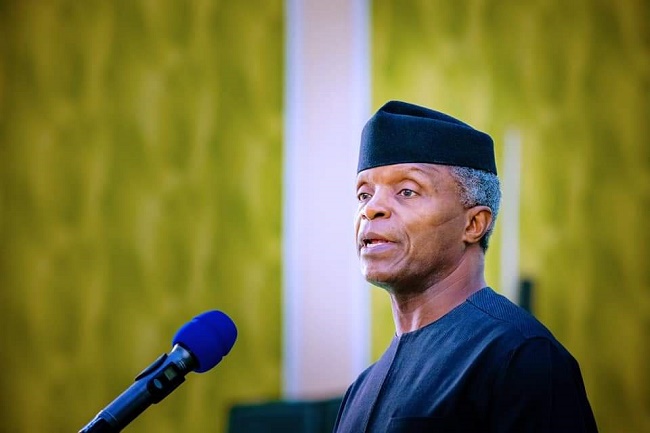Vice President Yemi Osinbajo says African countries account for less than one per cent of cumulative global carbon emissions.

Osinbajo disclosed this in his keynote address at the 60th Anniversary Dinner of the Oil Producers Trade Section (OPTS) of the Lagos Chamber of Commerce and Industry (LCCI) on Thursday, September 22, 2022, in Lagos.
The OPTS is a subgroup of LCCI, which is the umbrella association of oil and gas companies who have come together to promote their common interests.
Osinbajo, who spoke on the topic: “Nigeria Transitioning to Green Energy”, said that most hostile impacts of climate change on the continent were triggered by activities of wealthier nations.
The vice president said that most countries including Nigeria agreed that there was need to reduce global emissions to zero in Nigeria’s case by 2060.
“We are major victims of the effects of climate change, but there are a few important issues that we have flagged to our wealthier brother-countries in the global north.
“The first is that we, in the developing world are faced with two, not one crisis; one is climate change and the other is extreme poverty, the cause and consequence of which is energy poverty.
“Or the fact that lack of access to electricity for millions is a cause of deepening poverty.
“The second is that African countries are the least emitters of carbon today – less than one per cent of cumulative CO2 emissions and even if we triple electricity consumption in African countries (aside from South Africa) solely using natural gas this would add just 0.6 per cent to global emissions.
“So, a lot of the flooding and adverse weather events that we are experiencing here are from emissions caused by the wealthier countries.’’
The vice president said thirdly, the defunding of gas projects to force gas rich countries like Nigeria to stop using gas and use renewables instead was faulty.
According to him, the proposals to ban the funding of fossil fuel projects make no distinction between upstream oil and coal exploration and gas power plants for grid balancing.
He said that no economy in the world had been known to use renewables solely to industrialise as solar power simply did not have the base load capacity yet for industry.
“Fourthly, stopping the use of gas means that we cannot use Liquefied Petroleum Gas (LPG) for clean cooking stoves to replace the use of kerosene, firewood and charcoal which are dirtier fuels that are widely used for cooking and other domestic purposes, particularly in the rural areas.
“The use of firewood means cutting down trees and of course desertification and then the loss of our carbon sinks.
“The fifth is the double standards that wealthier countries have adopted on this issue.
“Today in the wake of the energy crisis, many European nations have made recent announcements to increase or extend their use of coal fired power generation through 2023, and potentially beyond.
“This is in violation of their climate commitments, and analysis suggests that this will raise power sector emissions of the EU by 4 per cent – a significant amount given the high base denominator of EU emissions.’’
Osinbajo said that the sixth and perhaps most crucial point was that Nigeria must take quick and informed actions in its national interest.
He said that the country must take the threat of no investments in fossil fuels including gas seriously.
“For an example, many European and other global North countries are setting aggressive targets for use of electric vehicles and the banning of combustion engine vehicles.
“Soon there may be only a few countries using combustion engines; it is also evident that while the Russia- Ukrainian war has shown the hypocrisy in not allowing public funding for fossil fuel projects, the wealthier nations are still of the view that this is the correct policy and that even if public funding is to be allowed financing should not go beyond 2035.
“So far, our response has been the Energy Transition Plan – a comprehensive, data-driven and evidence-based plan, designed to deal with the twin crises of climate change and energy poverty.
“We anchored the plan on key objectives, including lifting 100 million people out of poverty in a decade, driving economic growth, bringing modern energy services to the full population and managing the expected long-term job loss in the oil sector due to global decarbonisation,’’ he said.
He said that the plan recognised the role natural gas must play in the short term to facilitate the establishment of base load energy capacity and address the nation’s clean cooking deficit in the form of LPG.
The vice president urged the private sector to step up its participation in the transition to green energy journey.
Earlier in his opening remarks, Dr Michael-Olawale-Cole, the President, LCCI, said The OPTS was one of the outstanding members of the LCCI.
Represented by LCCI’s Vice President, Mr Gabriel Idohosa, Olawale-Cole said that OPTS had grown into an elite in the industry.
He said that LCCI was happy to lead OPTS’s for the passage of the Petroleum Industry Bill and then for the implementation of the Petroleum Industry Act.
The LCCI boss also submitted that fuel subsidy should be removed as it was not sustainable.
The highlight of the event was the handing over of plaques to former chairmen of OPTS by the vice president.
By Chijioke Okoronkwo
